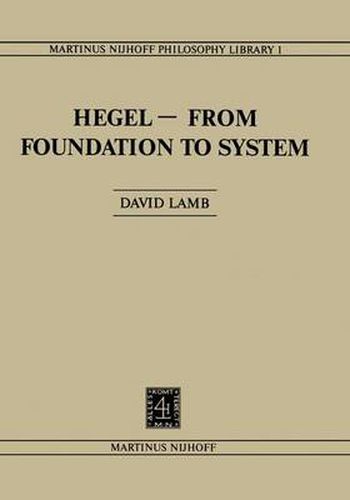Readings Newsletter
Become a Readings Member to make your shopping experience even easier.
Sign in or sign up for free!
You’re not far away from qualifying for FREE standard shipping within Australia
You’ve qualified for FREE standard shipping within Australia
The cart is loading…






This title is printed to order. This book may have been self-published. If so, we cannot guarantee the quality of the content. In the main most books will have gone through the editing process however some may not. We therefore suggest that you be aware of this before ordering this book. If in doubt check either the author or publisher’s details as we are unable to accept any returns unless they are faulty. Please contact us if you have any questions.
One of the guiding thoughts throughout this work is that G. W. F. Hegel is the philosopher of the modern age, that subsequent phil osophers, whether or not they have read his works, must take their stand in relation to Hegel. My purpose is not only to present Hegel, but to show that his influence has been felt for some time, even though his presence has not been explicitly acknowledged. In spite of a recent revival in Heglian scholarship, the history of philosophy in the English-speaking world is generally obscured by a period of darkness between Kant and the early inquiries of Russell and Frege. A place is assigned to Mill and Bentham, but even today very few Anglo-Saxon philosophers would be prepared to recognise Marx as a philosopher, although it is widely held that Marx was in some way influenced by Hegel, which is probably a good reason for not paying too much attention to the latter. At best, an understand ing of Hegel is relevant to an understanding of Marx, but it is not considered that Hegel made a significant contribution to the main stream of Western philosophy from Descartes onwards, and it is assumed that he is of little relevance to the ‘linguistic revolution’ pioneered by Wittgenstein, Ryle, and Austin.
$9.00 standard shipping within Australia
FREE standard shipping within Australia for orders over $100.00
Express & International shipping calculated at checkout
This title is printed to order. This book may have been self-published. If so, we cannot guarantee the quality of the content. In the main most books will have gone through the editing process however some may not. We therefore suggest that you be aware of this before ordering this book. If in doubt check either the author or publisher’s details as we are unable to accept any returns unless they are faulty. Please contact us if you have any questions.
One of the guiding thoughts throughout this work is that G. W. F. Hegel is the philosopher of the modern age, that subsequent phil osophers, whether or not they have read his works, must take their stand in relation to Hegel. My purpose is not only to present Hegel, but to show that his influence has been felt for some time, even though his presence has not been explicitly acknowledged. In spite of a recent revival in Heglian scholarship, the history of philosophy in the English-speaking world is generally obscured by a period of darkness between Kant and the early inquiries of Russell and Frege. A place is assigned to Mill and Bentham, but even today very few Anglo-Saxon philosophers would be prepared to recognise Marx as a philosopher, although it is widely held that Marx was in some way influenced by Hegel, which is probably a good reason for not paying too much attention to the latter. At best, an understand ing of Hegel is relevant to an understanding of Marx, but it is not considered that Hegel made a significant contribution to the main stream of Western philosophy from Descartes onwards, and it is assumed that he is of little relevance to the ‘linguistic revolution’ pioneered by Wittgenstein, Ryle, and Austin.